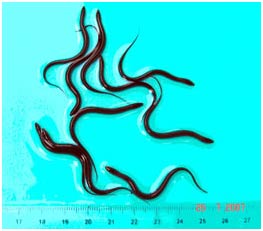Successfully breeding many freshwater fish species
In the face of the risk of many freshwater aquatic species in the lower Mekong River, it is increasingly scarce and in danger of disappearing. Recently, the Department of Fisheries - Can Tho University has successful research projects on artificial reproduction of many freshwater aquatic species in the Mekong Delta such as pangasius, freshwater fish, . more varieties of copper eel, snakehead fish, and climbing fish were successfully propagated, opening up many prospects for freshwater aquaculture industry in the Mekong Delta.
Dr. Do Thi Thanh Huong, Department of Fisheries - Can Tho University, said: The research team was successful in breeding copper eels (Monopterus albus). After more than a year of research, the team collected a full range of scientific data on the reproductive biology of eels.

Eels are artificially reproduced successfully from the work of the Department of Fisheries of Can Tho University.
By injecting different types of hormones (hormones), initially succeeded in cultivating maturity as well as stimulating eel breeding simultaneously. More than 35% of sexually transmitted eels have delivered. The group also successfully tested the incubation and eel feeding. There are now more than 1,000 eels of powder produced. With this positive result, the eel delivery process will be completed soon, and in the next period, the group will continue to study the eel intensive culture from artificial breeding breeds .
At the same time, Dr. Bui Minh Tam, a member of the research group to develop artificial reproductive techniques of copperfish species of the Department of Fisheries, has just announced that he has succeeded in cultivating mature and stimulating snakehead fish in pond and in tank .
According to Dr. Tam, the difficulty in stimulating the reproduction of snakehead fish is that males and females are difficult to distinguish and often mature at the same time, so it is difficult to determine the appropriate duration of sexual stimulation. However, the research group has initially determined the appropriate time, dose and type of sex stimulation for fish injection. Over the past two months, the group has delivered more than 35 pairs of fish (20 in composite tanks and 15 in land lots) and collected more than 20,000 fry.
In addition, the fisheries nutrition research group of the Department of Fisheries has also developed a high-survival seedling hatchery with high survival rate. From these successes, the process of producing snakehead fish seed will be completed and delivered soon to producers to take initiative in seedlings to meet the needs of commercial production.
For climbing fish, recently thanks to funding from the Department of Science and Technology of An Giang province, Department of Freshwater Aquaculture Technology, Department of Fisheries - Can Tho University in collaboration with Fisheries Extension Center and Aquaculture in An Giang province has successfully researched the reproduction of this breed.

Successful artificial reproduction of snakehead fish.(Photo: Thien Khiem)
As noted by the research team, broodstock are fully capable of sexual maturation in conditions of conditioning in ponds with proper nutrition. By stimulating artificial breeding by stimulating good ovulation fish, the rate of fertilized eggs reaches from 32–61% and the hatching rate ranges from 63–82%.
Currently, the Department of Freshwater Aquaculture Engineering, Faculty of Fisheries continues to test solutions to improve fertilization rate, hatching rate and larval rearing to soon complete the process of hatchling and transfer technical transfer to Mekong Delta farmers.
The source of natural fish in the Mekong Delta is increasingly declining due to over-exploitation and water pollution. Even with previous pangasius breeds of the Mekong River, wild fish has been rare for many years. Therefore, successful reproductive research projects have many meanings in restoring freshwater aquatic seed sources, especially specialty fish varieties in the Mekong Delta, supporting the fisheries sector to develop sustainably.
TK-HD
- An Giang successfully produces giant freshwater shrimp
- Artificial reproduction of the spotted fish, spotted fish
- Breeding fish successfully
- Things you do not know about marine fish statues
- Close-up of the species
- The world's rivers and lakes have lost nearly 90% of large species
- Discovered 12 new freshwater fish species
- Sea fish are descendants of river fish?
- Mekong River fish ranked
- Portrait of 12 new freshwater fish species in Vietnam
- Successful propagation of endangered coral fish
- Found a new breed of freshwater fish in Sri Lanka
 'Barefoot engineer' invents a pipeless pump
'Barefoot engineer' invents a pipeless pump Process of handling dead pigs due to disease
Process of handling dead pigs due to disease Radiometer
Radiometer Warp Engine: Technology brings us closer to the speed of light
Warp Engine: Technology brings us closer to the speed of light